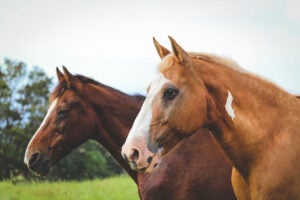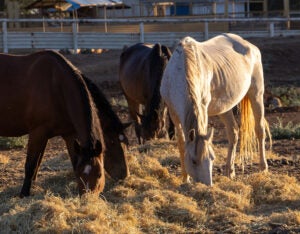Editor’s Note: This op-ed was written in response to an AGDAILY editorial piece titled, Hungry enough for horse? Why horse slaughter makes sense. The submission was facilitated by Scott Beckstead, director of campaigns for Animal Wellness Action and Center for a Humane Economy.
An editorial published by AGDAILY wants to put a happy face on the horse slaughter industry and suggests that American equines and even our society as a whole would be better off if we put horses on the menu. But for a long list of reasons — including deplorable animal welfare practices, lack of food safety assurances, and compelling economic arguments — we and the 83 percent of Americans who strongly oppose slaughtering horse for human consumption just aren’t buying it.
We are an equine veterinarian and an equine rescue professional, so we see every day the real consequences of the cruel and predatory U.S. horse slaughter industry. In 2007, the last foreign-owned horse slaughter plants were closed in the U.S. Yet even when equines were being slaughtered here pursuant to federal, state, and local laws and regulations, the U.S. Department of Agriculture documented countless instances of mistreatment of horses in the slaughter pipeline, including horses not being properly stunned and being fully conscious and aware while they are shackled, hoisted, and dismembered.
These appalling findings and overwhelming public opposition convinced Congress to defund USDA inspections, effectively ending horse slaughter in the United States. A recent investigation by two animal welfare organizations, Animals’ Angels and Center for a Humane Economy, documented systemic abuse and mistreatment of slaughter-bound horses by kill buyers in the U.S. and by slaughter facilities in Canada and Mexico, where our horses are slaughtered and butchered to be sold to foreign countries, including hostile adversaries like Russia and China.

American opposition to equine slaughter is rooted in the special place horses occupy in our nation’s history, culture, and imagination. Far from being food animals, equines are cherished icons and symbols of freedom and the frontier ethic that helped build this nation. They have been mankind’s partner in work, recreation, and sport. They have been explorers, guides and inspirations to many.
These aren’t merely romantic notions, they are facts. Horses may be legally defined as “livestock” under various state and federal laws, but that term does not necessarily equate with “food animal.” Even if they characterize their own horses as “livestock,” most American horse owners also consider them as companions, and only a small minority who use the slaughter market to dispose of unwanted animals would consider them as a source of food, but only for foreign consumers.
An insidious criminal element pervades the world of horse slaughter and is responsible for much of the suffering of slaughter-bound equines. Take, for example, Dennis Chavez, a well-known kill buyer convicted of allowing multiple horses to die of starvation; or Jason Fabrizius, Colorado’s most notorious kill buyer, who a year ago was fined $210,000 by a federal administrative law judge for knowingly shipping sick horses across state lines, putting an untold number of equines across the country at risk of illness and death. These aren’t the kind of people we should be allowing to operate in our country.
While some may not be persuaded, or may simply not care, about the systemic abuse and suffering of equines in the slaughter pipeline, they should be very concerned about the food safety problems. Because we don’t raise horses to be food animals, Americans give our horses a long list of drugs and medications that are toxic to humans when consumed. Phenylbutazone, or Bute as it is more widely known, is a common pain reliever found in the first aid kit of most American horse owners; indeed, it’s probably safe to say most domesticated horses in this country have been given Bute at one time or another in their lifetime.
But the European Union, one of the primary markets for meat from North American equines, has banned the import of any meat from any animals who received Bute at any time during their lifetime. Why? Because a study published in the journal Food & Chemical Toxicology showed that ingestion of Bute by humans causes a host of health problems, some of which are potentially fatal.

The lawlessness and criminality of the U.S. horse slaughter pipeline makes it impossible to trace the origins of horse meat, and thus ensure its safety as human food. Earlier this year, five medical and veterinary health professionals published a study in the American Journal of Veterinary Research showing that meat from U.S. horses is untraceable, meaning there is no way to guarantee its safety for human consumption. The study’s authors concluded, “If the United States is unable to put in place a regulatory program to remove horses administered banned drugs as exists for all food-producing animals, the exportation of American horses across both borders for the sole purpose of slaughter for human consumption must end.”
Aside from the animal welfare and food safety problems, turning our beloved equine companions into food animals doesn’t make economic sense. The number of American equines sold for slaughter has dwindled from a high of nearly 400,000 in the 1990’s to roughly 20,000 in 2022. But because of the suffering it represents, even that number is unacceptable. It makes far more sense to keep horses alive.
People buy feed, medications, tack, fence materials, vet and farrier services, pickup trucks, and horse trailers for their animals, and those purchases have a substantial positive impact on the economy. But the moment a horse is sold for slaughter, its contributions to the economy ends, and only the kill buyer benefits.
To answer the question in the title of the original editorial: Yes, it is far-fetched to imagine Americans turning our equine companions into table fare. Equines are far too important to our people to callously resign them to meat hooks and butcher shops. If horse-slaughter proponents want to eat horses, they can go to Russia or Japan and dine to their heart’s content. But here in the U.S.A., eating horses is, and always will be, un-American.
That’s why we urge all Americans who care about horses and their welfare to ask their members of Congress to cosponsor the Save America’s Forgotten Equines, or SAFE Act, to finally bring this horrific and irresponsible industry to a long-overdue end. Our horses have earned their cherished place in our nation and deserve to be treated with kindness and respect.
Debra West is the Founder of Liberty Sanctuary, an equine nonprofit that rescues and rehabilitates vulnerable equines from the slaughter pipeline. The organization also strongly supports passing the SAFE Act as a permanent ban to the slaughter of American equines.
Dr. Lisa Jacobson is an equine veterinarian who also has a strong beef cattle background. After 25 years of practice, she now divides her time between Colorado and a cattle ranch in Montana. She began studying the topic of horse slaughter in 2006 and concluded that the practice is inhumane and should be banned.


